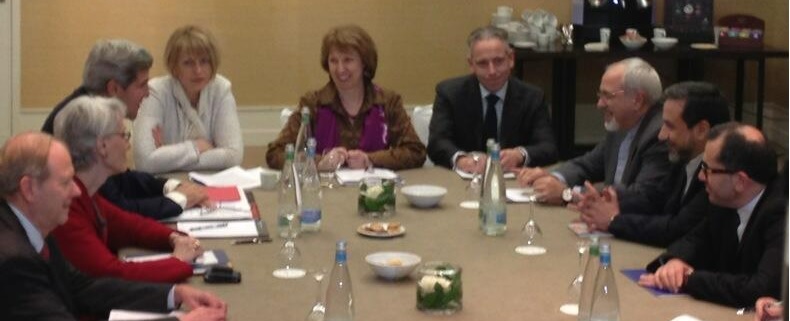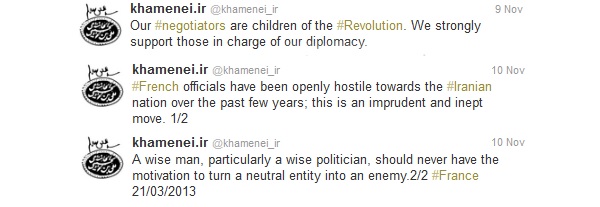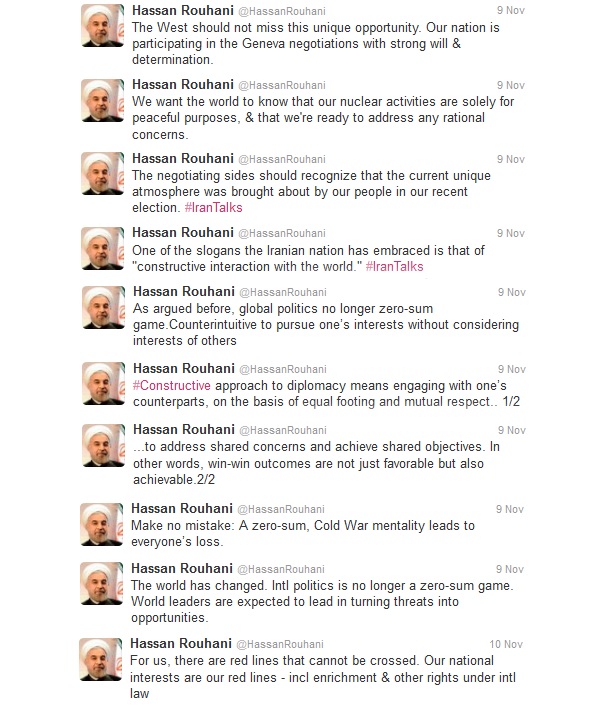Iran and the world’s six major powers made significant headway but ultimately failed to finalize an agreement at grueling talks between November 7 and 10. Foreign ministers from the United States, Britain, China, France, Germany and Russia rushed to Geneva as a breakthrough appeared imminent. But last-minute differences, reportedly spurred by French demands for tougher terms, blocked a deal that might have temporarily frozen Iran’s nuclear program in return for modest sanctions relief. Negotiators will resume talks in Geneva on November 20.
 “We have just come from a long meeting this evening with the E3+3 ministers, after three days of intense and constructive discussions. A lot of concrete progress has been achieved but some differences remain,” said E.U. High Representative Catherine Ashton and Iranian Foreign Minister Javad Zarif in a joint statement. The following are key remarks from press conferences, interviews and social media after the talks.
“We have just come from a long meeting this evening with the E3+3 ministers, after three days of intense and constructive discussions. A lot of concrete progress has been achieved but some differences remain,” said E.U. High Representative Catherine Ashton and Iranian Foreign Minister Javad Zarif in a joint statement. The following are key remarks from press conferences, interviews and social media after the talks.
Secretary of State John Kerry
“We were very, very close, actually, extremely close [to reaching an agreement]. I think we were separated by four or five different formulations of a particular concept…
“The Iranians had objections to certain parts of the language themselves which we had to work out and we had to negotiate. So there was still open negotiating beyond whatever the British or the French or the Germans or anybody else brought to the table. Obviously, the French have been more vocal about one thing or another, but the fact is that we had a unity on Saturday in a proposal put in front of the Iranians. But because of some the changes they felt they had to go back and change it.
“So we achieved unity. And we achieved, I think, a reasonable proposal that protected the interests that we’re seeking to protect, while recognizing this was a first step, not an agreement. The hardest part of this comes after the first step. But I was pleased with the amount of work done and we will just continue to work. That’s the nature of diplomacy.”
“The negotiations were conducted with mutual respect. They were very serious. But they were conducted in a very civil and appropriate way for a subject matter as serious as this one…We came to Geneva to narrow the differences. And I can tell you without any exaggeration we not only narrowed differences and clarified those that remain, but we made significant progress in working through the approaches to this question of how one brings in a program that guarantees this peaceful nature. There’s no question in my mind that we are closer now, as we leave Geneva, than we were when we came, and that with good work and good faith over the course of the next weeks, we can in fact secure our goal.”
Nov. 10, 2013 in a press conference in Geneva
P5+1 ministers were “unified on Saturday when we presented a proposal to the Iranians, and the French signed off on it, we signed off on it, and everybody agreed it was a fair proposal. There was unity, but Iran couldn't take it at that particular moment, they weren't able to accept that particular thing.”
Nov. 11, 2013 at press conference in the U.A.E.
Iranian Foreign Minister Mohammad Javad Zarif
"I'm not disappointed at all. What I was looking for was the political determination, willingness and good faith in order to end this…
"I think it was natural that when we started dealing with the details, there would be differences….Hopefully we will be able to reach an agreement when we meet again.
"We are all on the same wavelength and that's important... actually I think we had a very good, productive three days and it's something we can build on to move forward…
"We had a very good three days, a very productive three days. And it's something that we can build on."
Nov. 10, 2013 in a press conference in Geneva
On November 11, Zarif tweeted his reaction to Kerry’s claim that Iran’s negotiators were unable to sign the agreement.
On November 12, Zarif gave his first television interview on the talks. The following is a link, with English subtitles, to his appearance.
Supreme Leader Ayatollah Ali Khamenei on Twitter

President Hassan Rouhani on Twitter
Russian Foreign Minister Sergei Lavrov
“The meeting demonstrated that over that past year polemics and exchange of initial positions without any attempt to bring them closer are paling into insignificance in talks on this subject…Iran’s new leadership, and we hail it, has demonstrated its commitment to make steps in this direction and the talks with Iranian representatives were utterly concrete concerning practical aspects of the Iranian nuclear program.
 “We have just come from a long meeting this evening with the E3+3 ministers, after three days of intense and constructive discussions. A lot of concrete progress has been achieved but some differences remain,” said E.U. High Representative Catherine Ashton and Iranian Foreign Minister Javad Zarif in a joint statement. The following are key remarks from press conferences, interviews and social media after the talks.
“We have just come from a long meeting this evening with the E3+3 ministers, after three days of intense and constructive discussions. A lot of concrete progress has been achieved but some differences remain,” said E.U. High Representative Catherine Ashton and Iranian Foreign Minister Javad Zarif in a joint statement. The following are key remarks from press conferences, interviews and social media after the talks. 


